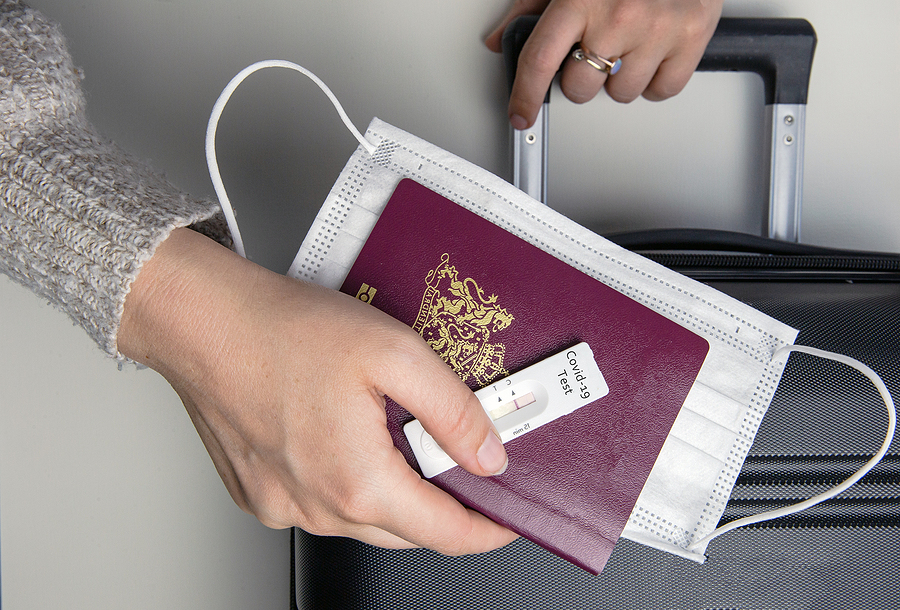
As business travel slowly returns to some parts of the world, new challenges present themselves, and old challenges need to be remembered and reassessed. While the world has not emerged from the COVID pandemic yet, I will term this period “near post-COVID.” Some countries are starting to see a reduction in cases, increased vaccination among their population, and a return to a more normal way of doing things. Along with these changes, business travel is slowly resuming, albeit with new complexity and new challenges.
The Effect of COVID-19 on Global Travel
International travel is more complex
My first international trip after the pandemic was from the US to East Africa. The first hurdle was to schedule a COVID PCR test within the window of time required by the destination country, while simultaneously ensuring I received the results prior to departure. I also had to consider and meet the requirements of the European country I was transiting en route.
Before departing from East Africa, I had to get COVID tested within the required window of the host nation, meet the requirements of both the transit country and the US, and again secure the results before embarkation. Any problem in this process, either coming or going, could scuttle the trip. A significant flight delay or missed connection could potentially cause a problem.
Complexity increases vulnerability
Different rules from country to country and ever-changing restrictions mean that even a well-intentioned traveler can make an error that can result in being denied boarding or that prevents departing a country due to invalid documentation. As a result, travelers face an increased risk of being stuck somewhere they did not want or plan to be, potentially for a significant period of time.
San Francisco Bay Area security consultant Greg Schneider, CPP, of Battle Tested Solutions, brought up a more ominous possibility during a panel on travel risk management: these regulations may increase the risk of extortion or harassment by unscrupulous officials in some parts of the world. Constantly changing rules and varying interpretations can fuel this. A traveler may get an unpleasant surprise when local officials say his or her “papers are not in order” upon arrival.
Traditional security and safety risks remain
Despite the increased attention and focus on COVID-19, more traditional risks have not gone away. In some cases, they may have significantly increased. When considering travel for ourselves or our staff, it is critically important that we keep this in mind. We cannot allow the focus on COVID and COVID prevention, mitigation, and compliance to blind us to other threats in the environment.
Direct and indirect impacts of COVID-19
We cannot rely on past assessments of locations, as they have likely changed. COVID-19 has affected both economies and societal dynamics around the globe. Increased unemployment may have contributed to higher crime levels and to civil unrest. Tension between various groups within the destination country may be exacerbated. Popular anger directed at governments may threaten political stability. All these factors need to be considered as organizations reengage in international business.
Support systems may have degraded or dissolved
As we reignite international business and send travelers abroad, we need to appreciate that things may have changed. Hotels that were previously approved may have closed or been severely degraded in terms of quality. Transportation companies that we relied upon to move travelers from place to place in foreign countries may have gone out of business. Local representatives that were our eyes and ears in that market may no longer be present or may have seen their capabilities decline. Medical resources may have been saturated with COVID patients, allowing for limited capabilities to handle other emergencies. If your travelers are involved in an automobile accident—statistically one of the greatest risks—will emergency response services and medical facilities be able to provide adequate treatment?
Business partners may have changed
Much like the resources mentioned above, business partners may have changed or find themselves in a new situation. Key personnel may have left, and institutional knowledge may have deteriorated.
Things to Consider Before Traveling
Considering all these potential factors, it is a good time to re-evaluate the landscape as we return to business travel and resume global operations. This re-evaluation can include conducting a fresh risk assessment of a foreign location or a due diligence investigation on a business partner. The key thing to keep in mind is that we can’t afford to take things for granted or assume that things have not significantly changed.
Some things we may want to consider going forward:
COVID restrictions at planned destinations
What is required to enter the target country? Is testing mandatory? If so, what type and within what time frame prior to travel? Is there any quarantine required? If required, does it need to be done at a location designated by the host government or at a location of the traveler’s choosing?
When a quarantine is mandated, we need to determine whether the business case for travel supports the lost time and potential cost of the quarantine. If at a government-mandated facility, does it meet our safety and security requirements for travelers?
Beyond the destination country requirements, we need to consider if other countries will be transited en route and what restrictions those countries have for transit passengers. Does the country require proof of a COVID vaccination? If so, we need to determine if there are restrictions on the type of vaccine used and what proof of vaccination is required. Does being vaccinated reduce the other restrictions that may be imposed on travelers?
Finally, we must look at what restrictions and requirements exist to re-enter the traveler’s home country at the end of the trip. This will often vary, depending on the country that the traveler is coming back from and the requirements of that traveler’s home country. These COVID considerations make travel planning significantly more complicated.
Reassess risks at travel locations
The pandemic has caused significant economic and societal impact in much of the world. This can translate into higher crime rates in some areas, increased civil unrest, and other conditions that may impact a traveler’s risk level. This is not to say that every location has taken a negative turn, simply that it is prudent to reassess the places we send our travelers to see if things have changed since our pre-pandemic travel, and if so, in what ways.
Review resources, suppliers and partners
As re-engagement begins, it makes sense to get an update on the capabilities of vendors and resources that support your international business travelers. Has there been a degradation in the quality of support they can provide your travelers? Likewise, consider reviewing business partners that your travelers may engage with. Are there any concerns that may have arisen during the pandemic that could affect your business relationship?
Examine contingency planning and crisis management
If your travelers encounter an emergency, are your capabilities to manage that situation still robust? What new elements may be in place that would affect these contingency plans? If your travelers are in a location where COVID cases remain high or where COVID has had a significant impact on the healthcare system, you may want to reassess the ability to deal with a traveler’s routine or emergency medical care.
As business travel resumes, it is prudent to re-examine each of these critical areas. Better understanding of the global landscape—and any changes in it—will prepare you and your organization to re-engage internationally.
—————————————————————————————————————
A former infantry officer in the US Marine Corps, Patrick Kane, CPP, is a security director working for a global logistics provider, with more than 20 years of experience in corporate security. He is the author of the book Practical Security Training and a contributing author to Personal Security, written by Tanya Spencer.













